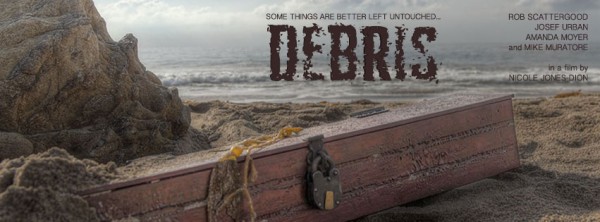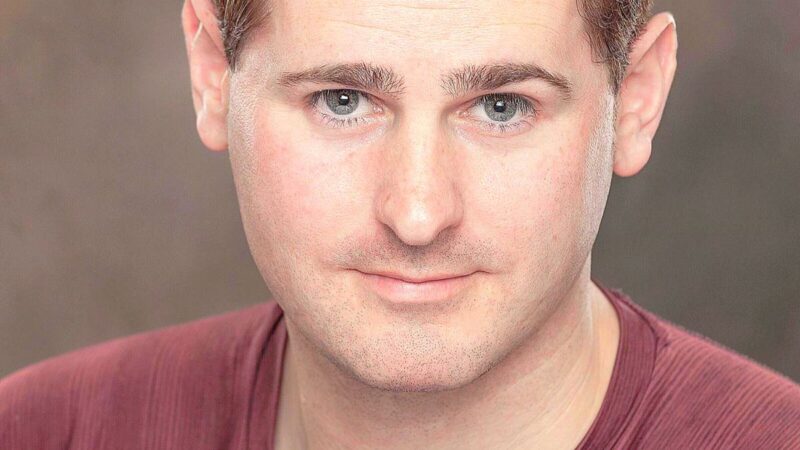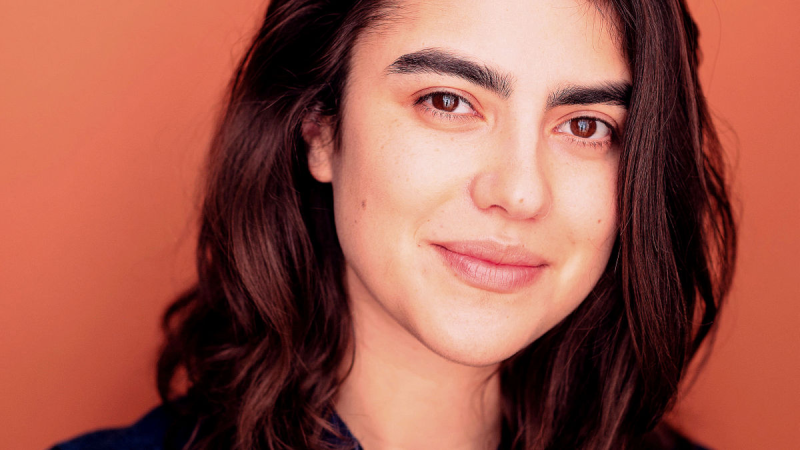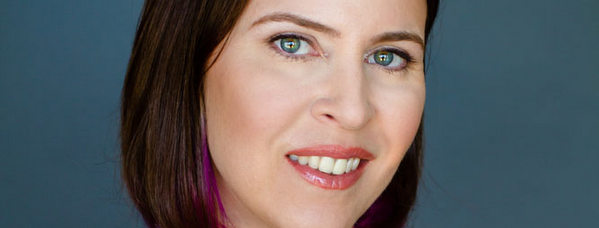
Nicole Jones-Dion is an award-winning screenwriter who specializes in genre films. After starting out in the video game industry, she then segued into comics, television and film. Her feature credits include DRACULA – THE DARK PRINCE, starring Academy Award-winner Jon Voight; and TEKKEN 2, based on the best-selling martial arts video game. She has also written on assignment for producers Sean Cunningham (FRIDAY THE 13TH), Mark Lester (COMMANDO), and Barney Cohen (SABRINA THE TEENAGED WITCH), among others. Under the mentorship of Sean Cunningham, she is now transitioning into directing.
The film I worked on for the LA 48 Hour Film Project ‘The Thing’ is now up! https://t.co/mw2HwedFcT
— Nicole Jones-Dion (@novaris) September 22, 2015
How would you describe your work as a director
I’ve always been attracted to weird fiction and these are my favorite types of stories to tell. I grew up reading pulps like WEIRD TALES and watching old episodes of the TWILIGHT ZONE, so whenever someone compares my work to these, I consider it a high compliment.
How did you get into directing
Early in my screenwriting career, I had a producer ask if I had ever considered directing because they said I wrote visually, like a director. But I only got serious about directing when I realized how little influence I had over the finished film. Ultimately, a film represents the director’s vision, not the writer’s. So if I wanted the end result to match what I saw in my head, I would have to direct it myself. I’ve been very fortunate to have Sean Cunningham (creator of FRIDAY THE 13TH) as my mentor. He’s been a fantastic source of guidance and inspiration.
How do you choose a project to direct
Right now, I’m mostly focused on developing my own stories. I like to explore themes of secret realities — of fantastical or terrible worlds hidden within our own. I like to think that magic is real and we’ve just turned a blind eye to it. But I’d be open to directing someone else’s material if I felt it spoke to me.
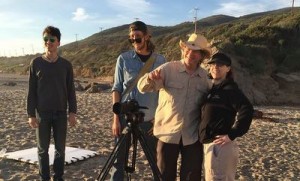 What uniqueness can female directors bring to TV or Film or Cinema
What uniqueness can female directors bring to TV or Film or Cinema
I think women bring a different feel and sensibility, especially to genre projects. The horror genre in particular is notorious for having shallow characters and thin plots; I think women help bring a new sense of depth and a different perspective.
Do you take courses to increase you craft
I’ve taken directing workshops with Mark Travis and Darrin Scott. And I’m part of a group called The Sandbox, which is made up of actors and directors who meet every week. We’ve done a 48 Hour Film project together and both of my short films use a lot of Sandbox actors.
What books do you read
Story is key, so I read a lot of screenwriting books (Blake Snyder’s SAVE THE CAT, Paul Chitlik REWRITE, any of the blue books by Bill Martell). On the directing side, I have mostly reference books like FILM DIRECTING SHOT BY SHOT by Steven D. Katz, the MASTERSHOTS series by Christoper Kenworthy, GRAMMAR OF THE FILM LANGUAGE by Daniel Arijon, and Mark W. Travis THE FILM DIRECTOR’S BAG OF TRICKS. There are some great vlogs, too, like EVERY FRAME A PAINTING. I can’t recommend that one enough.
Why will you choose an actor, writer or producer. What do you look for
For actors, there is a certain “it” factor that’s hard to define, but you know it when you see it. You want an actor who is flexible and takes direction well, who you can communicate with and they “get” it. I can’t speak to writers, since I’ve only worked on my own scripts. For producers, it’s important to find someone who shares your vision and has the means by which to help make it a reality.
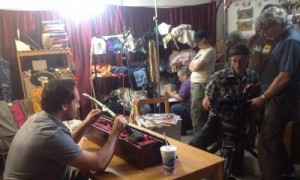 When you are offered a project, what things do you put in place to do a good job
When you are offered a project, what things do you put in place to do a good job
I’ve been very fortunate to work with some amazingly talented people on my films so far, so I’ve been able to build a reliable team that I know can deliver great results.
Briefly explain your latest work
My latest film is a short horror/thriller called DEBRIS about a down-on-his-luck treasure hunter who finds a cursed samurai sword washed up on a California beach. It was inspired by stories of debris from the Fukushima tsunami coming ashore in the US and Canada. It’s a proof-of-concept for a feature and it’s been well received so far — we’ve already gotten into a dozen festivals and the word of mouth has been very encouraging.
What thing/situation helps you during production
Since we were shooting on a popular beach in Malibu, I wanted to make sure we had a permit, just to be safe. I know I probably lose guerrilla filmmaker cred by saying that, but it was only $65 and it totally saved our bacon. Halfway through our day, an unauthorized film crew tried to set up right in our line of sight. They were being real jerks about it until we showed them our permit. We only could only afford one costume for our lead actress, so for her big death scene, she had to nail it in one take because after that, she was totally covered in blood. Luckily, she pulled it off and it looked great.
What thing or situation helps you during production
We spent a lot of time on pre-visualization and rehearsals… going through the storyboards and shot list ad nauseam until I knew every little beat by heart. Of course, things change when you’re actually on set and we had to make last minute adjustments here and there, but having done all the prep work ahead of time really helped.
How can filmmakers finance projects
So far, all of my films have had some aspect of crowdfunding and that’s worked well for me. But these are just shorts. I haven’t tried to finance a full feature yet.
What do you want from an actor in production
I like actors who aren’t afraid to take risks. Go big or go home. It might not be a direction I necessarily agree with, but at least it shows me the actor is thinking about the character and trying to do something with the role. I’d rather see a bold choice than a boring one. I can adjust bold. There’s not much I can do with boring.
What do you think a director can do to get into the film industry
The path I’ve been on so far is to write and direct a few short films just to get them under my belt. Beyond that, we’ll have to see what happens next.
Who is your favorite director
I really like Guillermo del Toro.
Why this director
He has an incredible visual aesthetic. If you look at his films like DEVIL’S BACKBONE and PAN’S LABYRINTH, he embraces that same concept of “hidden realities” that I find so appealing. In those films, the ghosts and creatures of the night aren’t the monsters, the true monsters are the people in the real world.
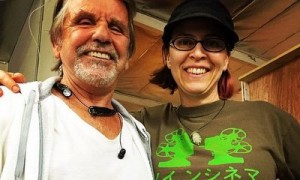 What advice would you give to directors around the world
What advice would you give to directors around the world
Don’t give up. There’s never been a better time to be a woman director. Now that the issue of gender inequality has finally been raised, there is more awareness and more efforts to include us than ever before.
Briefly write about your career
I never went to film school, so short films have been my film school. I started out by co-directed a supernatural thriller that I wrote called DEVIL’S DEAL and then went on to direct my first solo project DEBRIS. Next on the horizon is another supernatural thriller DEATHDATE and a comedic web series that I’m developing with my husband.
INTERVIEWS
more interviews

